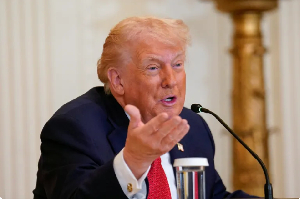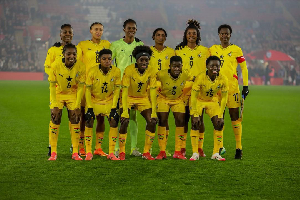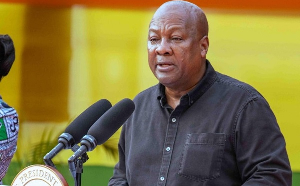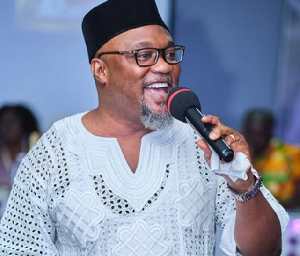Mojo Odyssey: FROM KUFUOR?S, NKRUMAH?S, & RAWLINGS? CLOSET.
Our suspicious nature is so well embedded in our body politic that we tend to ignore genuine compatriots who draw attention to mistakes of our rulers. We ascribe ill-motive as their rationale. Strangely, it is usually a different story, when foreigners speak. We tend to listen to them more than we condemn them.
With that in focus, it is perhaps proper at the beginning of this piece to refer to the World Bank Country Director, Mr. Mat Karlsson?s advice on Human gold (Ghana?s potent Human Resource material) and Agriculture as one of the avenues for alleviation of poverty, as a 'gift' one man can give a whole nation. Ayekoo, Mr. Karlsson!
Kufuorites have shown a CULTURE OF INTOLERANCE to criticism of their hero?s erring ways. Sorry to disappoint them this time: Kufuorites would have to vent their spleen on a non-Ghanaian who dissects their kingpin?s foibles. It may be a surprise, if they actually do not pour invectives on folks who bring Karlsson?s message to them! Mr. Kufuor has till 2008 to undo the serious damage he has done to his own reputation.
Thayer Watkins of Silicon Valley USA looked into Kwame Nkrumah?s closet and aired out some ?dirty laundry?. Edgar Cooke, an economist peeked at Jerry John Rawlings umbrella and got wet on a dry day, and Mats Karlsson, World Bank Country Director, like a Zoo Keeper, raised the elephant?s tail and got splashed with mess, or something unpleasant.
Dear Reader, our task here is simple. We intend to observe what these people saw and follow up with our own random thoughts. We will peek into ?hidden boxes? of our prominent leaders opened! by Thayer Watkins, Edgar Cooke and Mats Karlsson to see whether we agree with their conclusions. We keep mulling why Ghana has fallen behind other nations who won independence just around the same time as Ghana?s? Has it not been easy to blame military coups as cause for our economic instability? Has it not been easy to blame the Colonialist, the white man and Dear God, for our seeming perpetual state of poverty? Has it not been difficult for us to be honest about disastrous decisions fostered on us as a nation by people we entrusted our destinies with? Analyzing the errant ways of our ! leaders that caused significant mistakes and seeing what could have been done differently, would help future leaders make better choices.
3 past and present leaders who have been Presidents of Ghana for 5 or more years feature in our discussion on some of their failings. Some random thoughts: Measure their failure by each drop of fresh water from the Volta and other rivers that flow wastefully through un-irrigated arable lands into the Atlantic Ocean. Measure their success by how they have dealt with or attempted to deal with, resources and opportunities to turn the Accra Plains, Afram Plains into the bread basket of Africa?..before PRAISE or CONDEMNATION!
ON JOHN AGYEKUM KUFUOR: NPP 2001-PRES! ENT (Term ends 2008)
?TO WHOM MUCH IS GIVEN, MUCH IS EXPECTED? says the Good Book. Between 2001 and present, the Government of Ghana, under John Kufuor has received so much money from International Sources with not much to show for. In real dollar terms, Kufuor has received from ?development partner?s inflows from more than $600 million in 2002 and projected to hit $1.2 billion by the end of next year?, according to the World Bank Country Director, Mr. Mats Karlsson. The World Bank says John Kufuor has no reason to complain about economic difficulties because Ghana has all the resources for accelerated development at its disposal. "I think we ar! e at a stage where there are no excuses for Ghana. You've got your debt relief, you've got HIPC and you?ve got a double of development partner inflows over the past three years."
The hydra-headed nation-killer, CORRUPTION and INEFFICIENCY, have been identified as the causes of Kufuor?s economic distress. "It is part of the corruption issue and I don't want to mince words on this: it is still a real issue," Mr. Karlsson laments. This leaves Mr. Kufuor with mud on his face in rejecting charges that there is corruption in his administration. He has under his command the awesome machinery of State Investigatory Power! s, the Police CID, SFO, BNI, CHRAG, yet he wants ordinary folks to investigate myriad cases on corruption and present him with dossiers.
The question of Kufuor?s inefficiency relates ?to whether the projects for which development partner?s monies were being released were actually being seen on the ground?. "If every school is supposed to have a set of textbooks, go to the schools and check whether they have the textbooks. What could be the answer?" intones Mat Karlsson. Karlsson says the same questions could go for the other sectors such as roads, health and agriculture, adding that even when the investments ! had been well implemented, "Are they being maintained and managed?"
He said development partners could not go beyond making financial resources available since the responsibility of strategizing, implementing and monitoring were functions of the country receiving the funds; else the bank and other development partners would be seen as stepping beyond bounds.
Dear Kukrudu Kufuorites, Can you defend KUFUOR? Tell us what he WILL do as a lame duck president and remove doubts of the World Bank Country Director. Kufuor has till 2008 to make history and Kufuorites should not insult Mr. Mat Karlsson, for, ?methinks, he doth speaketh truth?!
ON KWAME NKRUMAH: CPP 1957 TO 1966
Thayer Watkins in an essay faulted Kwame Nkrumah for the following economic fumbles:
?A sugar plant at Asutsuare was built without a water system and remained idle for a year before this flaw was corrected. A tomato and mango canning plant was built at Wenchi with a capacity to process 5,000 tons of tomatoes and 7,000 tons of mangoes each year. After it was built at a cost 80 percent above budget and ready to begin operations the authorities discovered there were hardly any mango trees in the area of the p! lant and it would take seven years for newly planted mango trees to start bearing.
There was to be a cattle hide-leather-shoe complex. The slaughter house was sited in the Upper Region at Bolgatanga, a not unreasonable decision since the north is the cattle-raising area of Ghana. However the markets for cattle in pre-Nkrumah times were not in the north, probably for good reason.
A tannery for turning the hides into leather was sited in the south at Aveyime. The plant in the north could not supply enough hides so the tannery had to import hid! es. The leather to be produced at Aveyime was to go to a footwear factory in Kumasi. After the excessive transporting of the raw materials and final product around the country the Ghanaian consumers were not willing to buy because they turned up to be shoddy products.?
Dear Nkrumahists, can you Defend NKRUMAH? Was Nkrumah sabotaged by the West who disliked his romance with the Eastern Bloc? The little I can say for the great African Pioneer is this: His main goal was for Africa to Unite. His mantra was ?Seek ye first the political kingdom and all other things shall be added?. Our Ghanaian tradition is to be capable of taking responsibility for a household before you set one up. Did we need to be economi! cally viable with our ?economic kingdom? before setting up our ?political Kingdom?? The egg and the chicken, which comes first? In setting up all these factories, Nkrumah might have wanted to get people to work, set Ghana up one step ahead of other newly emerging Independent States and bring in Raw Materials from other African States to the extent Ghana could not produce them herself. Mangoes abound in Sierra Leone and The Gambia, Cows spread across Mali, Burkina Faso etc. When Valco was set up, Kaiser transported Aluminum Ingots from Tema to Jamaica where they had their plant. Why couldn?t Nkrumah transport raw materials from other countries into Wenchi to foster African Trade?
One troubling note on the tannery: Did Nkrumah factor in the Ghanaian palatal love for ?Wele? (burnt cow skin) in Okro stew? ?Wele? Cow Skin, not ?gracing? the cooking pot containing pea-nut butter soup is certainly an object of traditional artifacts, which at times cause war between tribes! So which other cow-skin was Nkrumah counting on to feed a shoe factory? Probably, from outside the shores of Ghana! Nkrumah ought to have ens! ured he had trade agreements with other nations to feed those factories with raw materials, if Ghana herself could not.
ON JERRY JOHN RAWLINGS: NDC 1993-2001 Edgar Cooke, an Economist dissects JJ Rawlings? financial sector administration thus:
?The Financial Sector had its fair share of scandals and bank closures. The Bank for Housing and Construction was liquidated. Ghana Cooperative Bank and Meridian BIAO (1) were likewise liquidated.National Investment Bank had cases of embezzlement to the tune of millions of Cedis. One! such case reported in the press had the Accountant and a Deputy Managing Director dismissed.
A scandal in January 1997 at Ghana Commercial Bank and involving the Managing Director of A-Life supermarket chain, who owns 4% of GCB put to test and raised suspicions about the Bank of Ghana's regulatory capacity. The scandal involved the use of a generous overdraft facility and Cheque cashing privileges to cash over 75 billion Cedis of GCB and two other banks.
Interest rates were high. These high interest rates were attributed to excessive government borrowing from the public. These rates fell from their 1990 high in 1991 but started climbing again in 1994 peaking at an all time high in 1997. In 2000, the prime rate stood at 45%, 91 day Treasury bill rates was 42.72% and that of the 182 day Trea! sury Bills and 1 year notes were 37.70% and 42.80% respectively.?? manufacturing and domestic trade, used up 47% of the total loans and advances (excluding cocoa marketing). Since 2001, the Manufacturing Sector?s share has decreased from 31% to 25% while that of domestic trade has increased from 11% to 23%. The falling share of the manufacturing sector is of great concern and which is amplified in the performance of the industry sector in GDP. The increased lending to domestic trade and its unproductiveness affected the industrial sector. The BOG failed to mop up excess liquidity in the system. Currency outside the banks increased from its 1990 figure of 20% to 41% in 2001.?
Dear Akatamansonians, can you defend RAWLINGS? The little I can say for Rawlings is that, perhaps in his ?dotage? he gave free pass to Yaw Osafo Marfo, current NPP Minister with alleged Presidential aspirations, who supervised the collapse of Bank for Housing and Construction as its Managing Director prior to wading into politics. It is unfathomable to think that in the early days of the Revolution, an A Life Executive would dream of misusing Banking privileges when Rawlings? own mentor Rear Admiral Amedume had been executed for borrowing 50, 000 Cedis from a Bank! Where had the Eagle flown to, when greedy businessmen and corrupt public officers like the Mamponghene?s wife splashed egg on Rawlings? face? Rawlings? political life started with a BANG, but ended with a whimper.
Rawlings should not be faulted for trying to adapt to the universal truth: For a country to develop it has to industrialize. Rawlings can point to the f! act that he was trying to resuscitate the manufacturing sector which was the largest user of the loans and advances followed closely by domestic trade. Rawlings can surely attest to the fact that there was an increase in manufacturing during his period 1990 to 2001.
Mojo Odyssey pondering on what might have been for Ghana!















